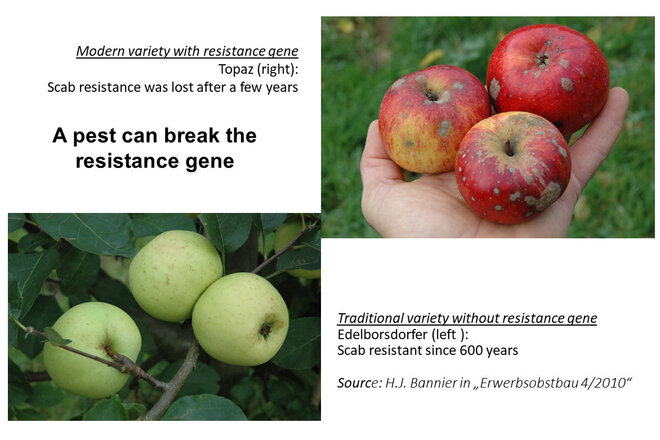01/01/2024, 21:41
Dear signatories,
As if the deregulation of genetic engineering and the legal reform of seed marketing were not enough of a threat to crop diversity, plant health legislation is also currently being amended.
We start with information on the status of the registration obligation for seed savers. At the end of this message you will find two links to petitions against the proposals for reform of seed marketing legislation and the deregulation of new genetic engineering.
In 2021-2022, you thankfully signed the petition against the registration obligation for professionally engaged seed savers to plant protection authorities. Recently, the EU Commission presented an amendment proposal. It still does not include an exemption for the conservation of diversity!
In the proposed amendment, the problem would remain unchanged: Professionally committed seed savers must register officially and fulfil a number of administrative tasks if they sell seeds and seedlings of rare varieties of tomatoes, beans and some other vegetables or scions of rare fruit and nut varieties to hobby gardeners, and if they wish to use a web shop for this purpose.
They can also commission an authorised company to do this: provide a risk prevention plan, issue plant passports, ensure traceability, draw up reports, support inspections and, if an infection is found, even destroy rare varieties.
For the small batches of rare varieties and species, the costs of maintaining diversity would increase considerably more than for seeds produced in large quantities for commercial agriculture.
Many of those affected could give up their already labour-intensive conservation work due to the additional administrative work or not even start their careers. Due to the regulations on traceability and eradication, rare and diverse varieties could simply be destroyed.
However, the risk of so-called quarantine pests spreading in our gardens is low. We do not have monocultures, do not operate large fields or greenhouses for propagation and hybridisation, not even in other climate zones of our planet, and do not sell our seeds worldwide in large quantities for commercial cultivation. We pay attention to the health and resistance of each mother plant that we have selected as a seed carrier for our rare varieties.
Tracing and eradication are not the only scientific approach, nor is there a consensus in the field of plant health. However, they form the sole basis of legislation. In addition, modern breeding focusses on individual resistance genes. However, these resistances are broken too often or too quickly to represent a sound strategy for maintaining plant health. See the photo above for example! It has also been scientifically proven that vital plants can also be carriers of harmful organisms without becoming ill. It would be wrong to destroy healthy plants just because they carry harmful organisms. It is precisely the polygenic properties underlying plant health in these cases that are important for climate-resilient cultivation systems.
On the one hand, the EU Commission (out of concern for plant health) burdens even the smallest professional producers of diversity seeds with maximum bureaucratic effort, but on the other hand it deliberately wants to dispense with the precautionary principle when deregulating genetically manipulated plants. This is so contradictory that it gives rise to the suspicion that the EU is deliberately pursuing the policy of large corporations when it comes to genetic engineering - against the will of EU citizens, who have rejected the use of genetically modified plants in agriculture in all surveys for decades and buy GMO-free products. Unlike the USA, the EU even wants to dispense with liability rules. The promised genetically modified plants adapted to climate change still do not exist. They are uniform, while the diversity varieties with their broad genetic make-up can adapt better year after year.
The conditions for diversity varieties have improved somewhat in the EU in recent years, without any reform. Now the seed law reform wants to undo some of this. The seed law also wants to introduce registration, including for individuals and micro-enterprises professionally involved in diversity conservation.
It also wants to make sustainability a condition for authorisation - you can guess where this is heading: Anything and everything could be labelled as sustainable, especially New Genetic Engineering products. No kidding: all existing and promised traits connected to New Genetic Engineering are mentioned in the law proposal as examples for sustainability.
What you can do:
Petition against the deregulation of new genetic engineering www.weact.campact.de/petitions/kennzeichnung-und-regulierung-aller-gentechnik-pflanzen-erhalten (in German)
Petition on seed law: Raise our forks for diversity! mitmachen.arche-noah.at/en/raise-our-forks (in English)
Join the "We're fed up" demonstration on 20.1.24 Berlin www.wir-haben-es-satt.de



